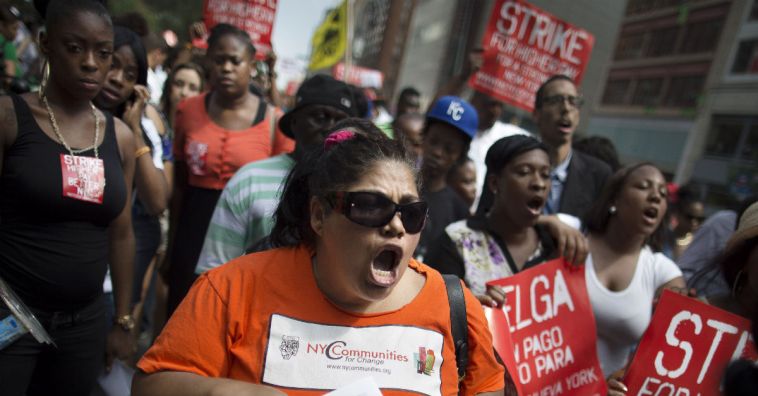This column originally appeared at Young Voices.
Videos By Rare
With a gridlocked Congress, President Obama has turned to executive action lately to enact his policy agenda. “I’ve got a pen and I’ve got a phone,” the President proudly proclaimed in his 2014 State of the Union address, marking the beginning of his “year of action.” Although the media has largely focused on executive actions related to his landmark Affordable Care Act, the President’s biggest mark may be left on another area of government that hardly gets any attention — labor. Here’s three policies that have been enacted by executive fiat over the past seven months that could fundamentally transform labor relations in the United States:
1. $10.10/hr. minimum wage for federal contractors.
The Obama administration has been aiming to enact a $10.10 minimum wage since it was first proposed last fall, but such hopes were quickly dashed with Republicans controlling the House of Representatives. So instead, the President applied the wage hike to the private-sector workers within his reach — namely, federal contractors who receive compensation for government projects such as highways, buildings, monuments, etc. According to an executive order issued February 12th of this year, all federal contractors must pay their employees a minimum of $12.12 per hour beginning in 2015, with the potential for future hikes to be issued annually by the Secretary of Labor.
What it means: The harm behind minimum wage hikes is basic economics. When the price of a good like labor increases, the quantity supplied decreases. Simply put, a minimum wage hike means less jobs, as established by numerous studies. However, this truism takes a more nuanced turn with federal contractors. Since the government is ultimately footing the bill, the wage hike for contractors may not have immediate effects on unemployment given the state’s tendency to rack up deficits and borrow debt to pay its bills. However, the long-term outlooks looks bleak, especially since the White House has been sparse on detailing how it will impact the budget.
2. Rigorous disclosure laws for federal contractors.
Only six short months after his wage hike to federal contractors, the President issued an executive order last week enacting rigorous new disclosure requirements for the employers. Contractors that receive over $500,000 in federal money will be required to disclose labor-law violations going back three years and institutes a labor contract advisor at every federal agency. While this may seem like a pretty innocuous new rule at first glance, it could be wielded as a powerful weapon in unions’ favor during labor disputes.
What it means: When unions find themselves in bargaining disputes with labor unions, they often like to grease the wheels for a favorable settlement by filing labor violation complaints with federal agencies. While such a practice was doubtlessly annoying in the past, it could prove fatal to a contractors’ business under the new executive order. Now a business faces tremendous pressure to settle all violation allegations and placate unions’ bargaining demands, lest they be found guilty of such violations in court and potentially lose all their federal contracts. In short, the new executive order greatly tilts collective bargaining in unions’ favor.
3. Treating franchises as joint employers.
The service sector has historically been the hardest area of the American economy for unions to organized because of the way businesses are structured. Unlike large manufacturing companies, service sector employers like restaurants are often small businesses or franchises like McDonald’s that are owned locally — though they may bear the brand of an international corporation. Thus, for a union to collectively bargain on behalf of McDonald’s employees, it would have to literally win a majority vote in every since McDonald’s franchise across the US — a seemingly impossible task. So instead, unions have taken to court in recent months to reshape the way franchises are treated under labor law. Last month, the National Labor Relations Board struck a major blow to franchised businesses like McDonald’s by ruling that the multinational corporation could be treated as a “joint-employer” along with the local franchise owner.
What it means: McDonald’s has vowed to challenge the ruling, but if it’s ultimately upheld, future labor disputes at specific McDonald’s stores could apply to the whole chain. One such future ruling could result in a vote to unionize the whole McDonald’s chain by a simple majority of its workforce, since it is now a joint-employer, instead of the current cumbersome process of going to each individual franchise. If such a ruling is made and such a vote is successful, fast food chains could be quickly unionized, resulting in higher prices at the drive-thru window and less employees.

